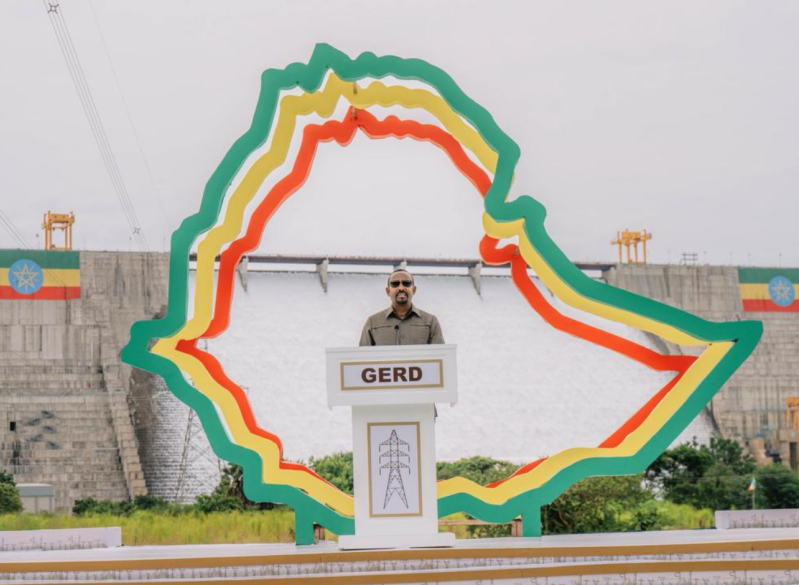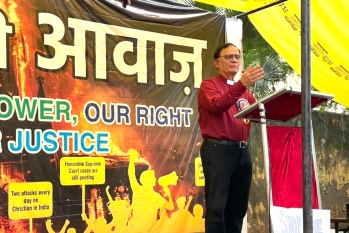
Ethiopian evangelicals hailed Prime Minister Abiy Ahmed’s inauguration of the Grand Ethiopian Renaissance Dam (GERD) as both a national milestone and an answer to years of prayer, framing the $5 billion project as a shared victory for faith and nation.
Ahmed inaugurated Africa’s largest hydroelectric dam on Sept. 9, 2025, terming it as “big achievement” and a testament of “what Africans are capable of accomplishing.”
GERD, which cost US$5 billion to construct over 14 years, will generate up to 5,000 megawatts of electricity, enough to cover Ethiopia’s electricity deficit and to supply some of the neighbouring countries such as Kenya, Somalia and South Sudan.
A sense of national pride enveloped the inauguration event in Benishangul-Gumuz region on the Blue Nile River near the border with Sudan as several heads of states joined Prime Minister Ahmed in celebrating a self-funded infrastructure project of such scale, a notable departure from the use of foreign debt to finance mega projects.
The country turned to domestic sources to fund the project when it kicked off in 2011 after international partners and lenders declined to support the construction of the dam. Ethiopia’s federal bank, the Commercial Bank of Ethiopia, financed 91% of the total cost from internal revenues. 9% of the funding came directly from the public through contributions, bonds and Ethiopians in diaspora collections.
The former Prime Minister Meles Zenawi, ignited a sense of ownership and determination at the on-set when he said, "No matter how poor we are, in the Ethiopian traditions of resolve, the Ethiopian people will pay any sacrifice". This challenge sparked an extraordinary mobilization of national resources and the collective will of the Ethiopian people.
A pivotal moment that sustained public support was the adoption of the motto "It's My Dam", coined by Ethiopia’s Chief GERD Negotiator and the Ambassador to the US, Sileshi Bekele, who in response to a question on who would manage the dam, said: "It’s my dam. We Ethiopians will manage it". This motto created a sense of ownership and motivated support across the nation, becoming a rallying cry promoted by government institutions, individuals, the church and media.
The Evangelical Churches Fellowship of Ethiopia (ECFE), which just celebrated its 50th anniversary, included the completion of the dam as part of its national conference held on Sept. 11. In a statement, the fellowship acknowledged that the GERD “has a unique attachment” with all Ethiopians regardless of their differences.
With evangelicals comprising 40% of Ethiopia’s 120 million population, ECFE argued that Christians took a “40% stake” in the project by way of contribution from believers, church institutions, development arms of different churches and Christian business owners.
“We evangelicals have been praying about effective usage of our resources that we are entrusted by God. Not only that, but also, we have been praying for the Lord to give us a leader with clear vision and commitment to realize that,” read part of the statement sent to Christian Daily International.
Barbados Prime Minister Mia Mottley, who was one of the chief guests at the inauguration, called the GERD an "Adwa engineering feat," remarking how the people of Ethiopia "stood tall and put their money where their mouth is" when international financing was withheld. The battle of Adwa was a significant historical event where Ethiopia successfully defended its sovereignty against colonial powers.
The 575 feet high dam will double the electricity supply in Ethiopia connecting more than half of the country’s population. It will not only address chronic energy shortages but also position Ethiopia as a major energy exporter in the region, boosting its foreign currency earnings by $1 billion annually, and foster industries and manufacturing. The dam is also vital for supporting rural development, reducing deforestation, and improving access to education and internet connectivity in rural areas.
However, the hydroelectric dam has also been a source of diplomatic tensions between Ethiopia and its neighbours Egypt and Sudan, who also share the Nile river. Egypt relies on the Nile for almost all of its water needs and has opposed the GERD on the fears that the dam could significantly reduce water flow to the most populous Arab nation.
Egyptian President Abdel Fattah al-Sisi has repeatedly termed the GERD an "existential threat," vowing to defend Egypt's water security. Sudan, too, has expressed concerns about the dam's impact on its own dam operations and seasonal flooding, though Ethiopia has argued the dam will help with flood control in Sudan.
Ahmed, an evangelical who has in the past spoken about the relevance of the Church in contemporary issues, has emphasized that Ethiopia has no intentions of harming Egypt and Sudan, insisting that “Ethiopia will never take away your rightful share. The hunger of our brothers in Egypt, in Sudan, or anywhere else is also our hunger. We must share and grow together, for we have no intention of harming anyone.”






